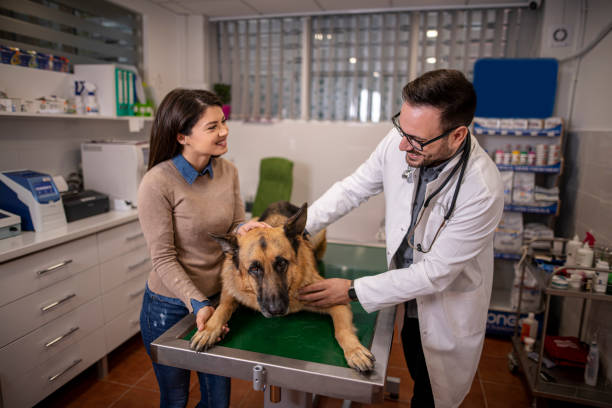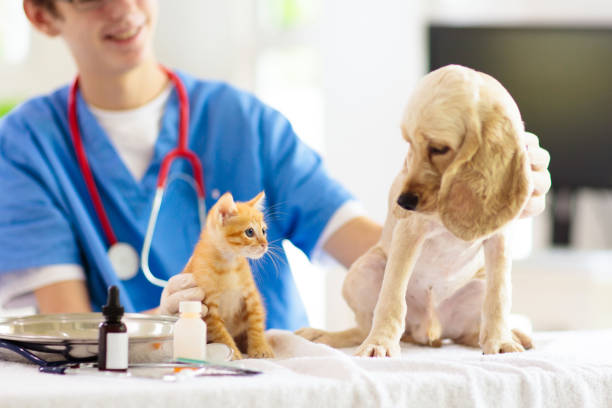Ensuring your pet’s well-being requires a proactive approach to veterinary care. Regular visits to the vet and access to essential services are key to maintaining your pet’s health and happiness. Here’s a comprehensive overview of must-have veterinary services that every pet owner should be aware of to provide optimal care for their furry companions.
1. Routine Wellness Exams
a. Annual Check-Ups
- Health Assessment: Routine check-ups are fundamental for evaluating your pet’s overall health. The vet will perform a thorough physical examination to detect any abnormalities and assess vital signs.
- Preventive Measures: Regular exams allow for early detection of health issues, which can lead to timely intervention and better treatment outcomes.
b. Vaccinations
- Core Vaccines: Essential vaccines protect your pet from serious diseases. For dogs, this includes vaccinations against rabies, distemper, parvovirus, and adenovirus. For cats, core vaccines include those against rabies, feline herpesvirus, calicivirus, and feline panleukopenia.
- Boosters and Updates: Vaccination schedules may require booster shots to ensure continued immunity. Your vet will guide you on the appropriate vaccination timeline based on your pet’s age, health, and lifestyle.
2. Dental Care
a. Professional Cleanings
- Dental Health: Regular dental check-ups and cleanings are vital for preventing oral diseases. The vet will check for signs of plaque, tartar, and gum disease, and provide necessary treatments.
- Cleaning Procedures: Professional cleanings involve scaling and polishing under anesthesia to thoroughly clean your pet’s teeth and gums, preventing dental issues and maintaining oral health.
b. Preventative Care
- Home Dental Care: Regular brushing and dental chews can help maintain your pet’s oral health between professional cleanings. Your vet can recommend suitable dental care products and techniques.
- Diet and Treats: Special dental diets and treats can also aid in reducing plaque buildup and supporting dental health.
3. Parasite Control
a. Flea and Tick Prevention
- Preventative Medications: Protect your pet from fleas and ticks with regular use of preventative treatments. Options include topical solutions, oral medications, and flea/tick collars.
- Treatment for Infestations: If your pet has a flea or tick infestation, your vet can recommend effective treatments and provide advice on managing and preventing future infestations.
b. Heartworm Prevention
- Monthly Preventatives: Heartworm disease is transmitted by mosquitoes and can be severe. Monthly heartworm preventatives are crucial for protecting your pet from infection.
- Testing and Treatment: Regular testing for heartworms is recommended to ensure your pet is protected. If heartworm infection is detected, your vet will provide a treatment plan.
4. Diagnostic Services
a. Laboratory Testing
- Blood Work: Routine blood tests provide insights into your pet’s overall health, including organ function, blood cell counts, and the presence of infections or diseases.
- Urinalysis: Analyzing urine samples can help diagnose conditions like urinary tract infections, kidney issues, and diabetes.
b. Imaging
- X-Rays: Radiographs (X-rays) are used to examine bones, organs, and other internal structures to diagnose fractures, tumors, and other health conditions.
- Ultrasound: Ultrasound imaging provides detailed views of soft tissues and organs, aiding in diagnosing conditions such as tumors, pregnancies, and abdominal issues.
5. Surgical Services
a. Routine Procedures
- Spaying and Neutering: These common procedures prevent unwanted litters and can contribute to reducing certain health risks and behavioral problems.
- Dental Surgeries: If your pet has advanced dental issues, procedures such as extractions or periodontal treatments may be necessary.
b. Emergency and Specialized Surgeries
- Emergency Care: For acute injuries, severe illnesses, or life-threatening conditions, immediate surgical intervention may be required.
- Specialized Surgeries: Complex surgeries, such as orthopedic repairs or tumor removals, are performed by specialized veterinary surgeons with advanced skills and equipment.
6. Preventative Health Care
a. Nutrition and Weight Management
- Dietary Advice: Your vet can offer guidance on proper nutrition to meet your pet’s specific dietary needs and maintain a healthy weight.
- Weight Monitoring: Regular weight checks and management strategies help prevent obesity and related health issues.
b. Behavioral and Wellness Counseling
- Behavioral Issues: Address behavioral concerns such as anxiety, aggression, or house training with professional advice and support.
- Wellness Plans: Develop a comprehensive wellness plan with your vet to ensure your pet’s physical and mental well-being, including exercise, mental stimulation, and preventive care.
7. Emergency and Critical Care
a. 24/7 Emergency Services
- Urgent Care: Many veterinary clinics offer emergency services or partner with emergency care facilities for urgent situations requiring immediate attention.
- Critical Care: Emergency services include treatment for severe injuries, poisoning, or acute medical conditions.
b. First Aid and Home Care
- Basic First Aid: Knowledge of basic first aid can be useful for managing minor injuries or health issues before seeking veterinary care.
- Home Care Advice: Your vet will provide instructions for post-surgical care, chronic condition management, and recognizing signs of distress or illness.
8. Holistic and Alternative Therapies
a. Complementary Treatments
- Acupuncture: Used to manage pain and support overall health, acupuncture can be beneficial for pets with chronic conditions or injuries.
- Chiropractic Care: Veterinary chiropractic care helps address musculoskeletal issues and improve joint function.
b. Herbal and Nutritional Supplements
- Herbal Remedies: Consult with your vet about herbal supplements that may support your pet’s health, such as joint support or digestive aids.
- Nutritional Supplements: Supplements like omega-3 fatty acids or probiotics can enhance your pet’s diet and address specific health concerns.
Conclusion
Understanding and utilizing essential veterinary services is crucial for maintaining your pet’s health and well-being. Regular check-ups, vaccinations, dental care, parasite control, diagnostic testing, surgical services, and emergency care all play important roles in ensuring your pet’s optimal health. By staying informed and proactive about these key veterinary services, you can provide your furry friend with the comprehensive care they need to thrive.

